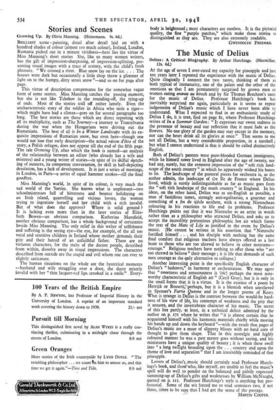Stories and Scenes
Growing Up. By Olivia Manning. (Heinemann. 9s. 6d.)
BRILLIANT scene - painting, detail after detail laid on with a hundred shades of colour (almost too much colour), Ireland, London, Rumania picked out in a minute vividness—here lies the virtue of Miss Manning's short stories She, like so many women writers, has the gift of impression-sharpening, of impression-splitting, pre- senting visual images with a trace of ecstasy, with the child's fresh pleasure. "We crossed a river. Blue snow lay on the ice. . . . The houses were dark but occasionally a little shop threw a glimmer of light on to the humpy, dirty street snow "—and so on for page after page.
This virtue of description compensates for the somewhat vague form of some stories. Miss Manning catches the passing moment, but she is not like Tchekov in the rounding-off, the tying-up of ends. Most of the stories trail off rather lamely. Even the uncharacteristic story of the soldier in Africa who stole a tiger— which might have had a climax—goes on for several paragraphs too long. The best stories are those which are direct reporting with all its multiplicity, such as The lourney—a journey to Transylvania during the war when the Hungarians were driving out the Rumanians. The best of all is ma Winter Landscape with its ex- quisite impressions of Rumanian snow, but even here—though one would not lose that early description—the actual raison d'être of the story, a Polish refugee, does not appear till the end of the fifth page. The tale Growing up, after which the book is named—an analysis of the relationship between an editor (who already has a wife and mistress) and a young writer of stories—in spite of its skilful sketch- ing of nuances, its competent conversation, its skill in half-depicting desolation, has a lack of development. It is just a series of meetings, in London, in Paris—a series of equal hammer strokes—till the final goodbye.
Miss Manning's world, in spite of its colour, is very much the sad world of the 'forties. She knows what is unpleasant—two schoolmistresses full of bitterness and bounce holidaying on an Irish island, quarrelling and vicious lovers, the woman trying to ingratiate herself and her child with a rich invalid. But of what does she approve? Where is solid ground ? It is lacking even more than in the later stories of Eliza- beth Bowen—an obvious comparison. Katherine Mansfield, another obvious comparison, has a whole background of certainties beside Miss Manning. The only relief in this welter of selfishness and suffering is the seeing eye—the eye, for example, of the all too vocal and sensitive children in Ireland whose mother demands their pity and their hatred of an unfaithful father. There are no virtuous characters, for the traits of the decent people, described from within, dissolve away in visual impressions. The characters described from outside are the stupid and evil whom one can ever so slightly caricature.
The human situations on the whole are the hysterical moments —husband and wife struggling over a door, the dusty miserly invalid with her "thin lacquer-red lips crooked in a smile." Every- body is heightened ; most characters are rootless. It is the pictorial quality, the fine "purple patches," which make these stories as distinguished as they are. They are also extremely readable.
GWENDOLEN FREEMAN.






























 Previous page
Previous page